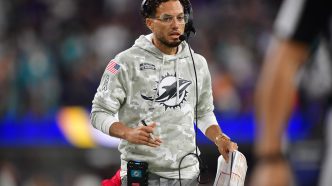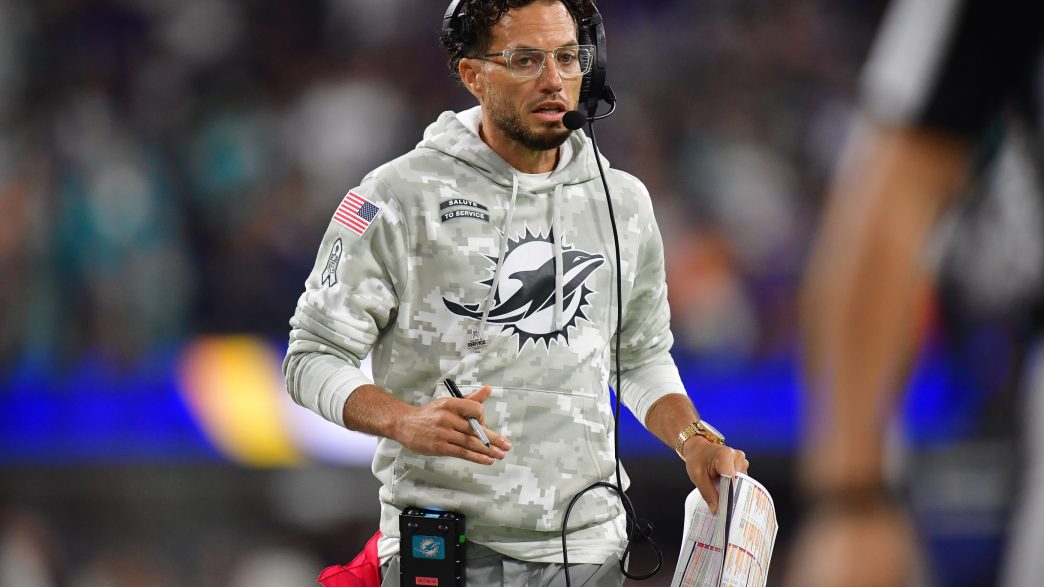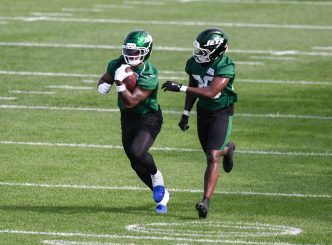The Miami Dolphins’ offense, once heralded as an explosive juggernaut, has hit a rough patch. The question swirling around South Florida is simple: Who’s at fault? Is it Tua Tagovailoa or head coach Mike McDaniel? This one’s on McDaniel.
Tua hasn’t been perfect. His decision-making has been questionable at times, and his struggles under pressure are well-documented. The real issue, however, lies in McDaniel’s inability to adapt his offensive game plan when things go south. Here’s why the head coach shoulders the bulk of the blame.
Early in the season, the Dolphins were torching defenses with their dynamic mix of speed and precision. Tyreek Hill was a nightmare matchup, Jaylen Waddle was a constant deep threat, and the running game complemented the aerial attack beautifully. But as the season progressed, defenses adjusted. They started playing more zone coverage, taking away the deep ball, and daring Tua to beat them with methodical, underneath throws.
What was McDaniel’s response? Not much. The Dolphins’ offense has become alarmingly predictable. Their reliance on certain formations and play concepts makes them easy to game plan against. When defenses take away their bread-and-butter plays, there doesn’t seem to be a Plan B. And that’s a coaching problem.
Tua is at his best when the offense is tailored to his strengths—quick reads, rhythm throws, and timing-based concepts. When McDaniel sticks to this script, the Dolphins’ offense hums like a well-oiled machine. But too often, we see Tua asked to make throws outside the numbers or to execute deep dropbacks behind an offensive line that isn’t built to protect for long periods.
McDaniel’s job is to put his quarterback in the best position to succeed, and lately, he hasn’t done that. It’s not about reinventing the wheel; it’s about leaning into what works and making subtle adjustments to counteract what defenses are doing.
Let’s talk about the running game—or the lack thereof. Early in the season, the Dolphins found success on the ground, which opened up their play-action game. Recently, however, the running attack has disappeared. Some of this falls on the offensive line, which has struggled in run blocking, but McDaniel deserves criticism for abandoning the run too quickly in games.
A balanced offense keeps defenses guessing, and the Dolphins have been anything but balanced. By becoming a pass-first team, they’ve made it easier for defenses to focus on stopping Tua and the passing game.
Coaching isn’t just about X’s and O’s; it’s about leadership. When the offense struggles, it’s the head coach’s responsibility to keep the team focused, motivated, and adaptable. McDaniel’s cool and calculated demeanor is a strength when things are going well, but during tough stretches, the Dolphins have lacked the urgency and resilience needed to right the ship.
The Dolphins still have the pieces to be a top-tier offense. Tua is a capable quarterback, and the skill-position talent is among the best in the league. But if the team is going to reach its full potential, McDaniel needs to step up. That means addressing the offense’s predictability, committing to the run game, and creating a game plan that maximizes Tua’s strengths while countering what opposing defenses are doing.
At the end of the day, the head coach sets the standard. And right now, Mike McDaniel’s standard isn’t good enough. It’s time for him to take a hard look in the mirror and make the necessary adjustments, because the Dolphins’ season depends on it.








